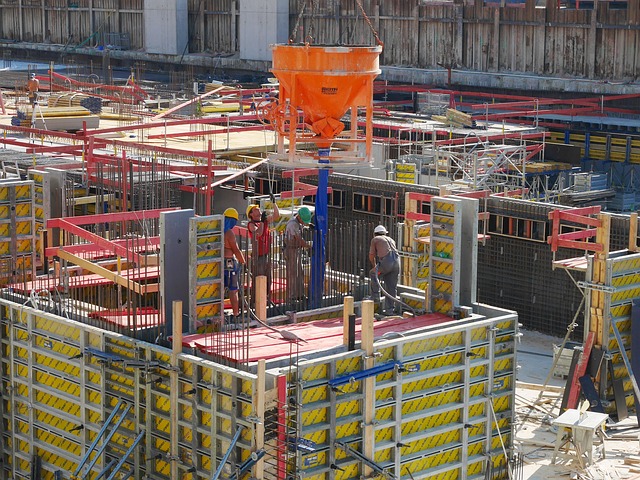Construction equipment loans provide specialized financing for businesses acquiring heavy machinery and vehicles, offering flexible terms, competitive rates, longer repayment periods, and substantial tax benefits like interest deductions and depreciation allowances. These strategies optimize cash flow, reduce taxable income, and foster growth in the construction sector, making them a game-changer for firms seeking to invest in modern equipment while maintaining industry competitiveness.
Construction equipment loans offer significant tax benefits, providing a strategic financial edge for construction businesses. This comprehensive guide, ‘Financing Strategies for Construction Businesses’, explores how these specialized loans can reduce your tax burden and optimize cash flow. We’ll delve into ‘Understanding Construction Equipment Loans’ and present ‘Case Studies’ demonstrating real-world examples of successful tax-efficient construction financing. By the end, you’ll be equipped with insights to make informed decisions regarding your construction project funding.
- Understanding Construction Equipment Loans: A Comprehensive Overview
- Tax Benefits: How These Loans Can Reduce Your Financial Burden
- Financing Strategies for Construction Businesses: Exploring Loan Options
- Case Studies: Real-World Examples of Successful Tax-Efficient Construction Financing
Understanding Construction Equipment Loans: A Comprehensive Overview

Construction equipment loans are a specialized financing strategy designed to support businesses in acquiring and funding the purchase of heavy machinery, vehicles, and other essential assets crucial for construction projects. These loans cater specifically to the unique needs of the construction industry, where large-scale investments in equipment are common. By offering flexible terms and competitive interest rates, these financing strategies enable contractors and developers to access the capital required to secure top-of-the-line equipment without straining their cash flow.
Understanding construction equipment loans involves grasping their structure, eligibility criteria, and potential tax advantages. These loans often come with longer repayment periods compared to traditional business loans, spreading out the financial burden over time. Furthermore, they may offer tax benefits, such as depreciation deductions, which can significantly reduce the overall cost of owning and operating construction equipment. This makes them an attractive option for businesses looking to optimize their finances while investing in vital assets for project success.
Tax Benefits: How These Loans Can Reduce Your Financial Burden

Construction equipment loans offer more than just funding for your projects; they also provide significant tax benefits that can help reduce your financial burden. One of the key advantages is the potential for interest deductions. The interest paid on these loans is often tax-deductible, which can lower your overall taxable income. This is a powerful financing strategy, especially for businesses in the construction sector, as it allows them to offset a portion of their borrowing costs.
Additionally, the depreciation of construction equipment can provide further tax advantages. When you finance the purchase of equipment through a loan, you may be able to depreciate the asset over time, reducing your taxable profits. This is particularly beneficial for high-value machinery and vehicles that are essential to your operations. By strategically utilizing these financing strategies, businesses can optimize their tax liabilities while investing in the resources they need to grow and thrive in the construction industry.
Financing Strategies for Construction Businesses: Exploring Loan Options

Construction businesses have unique financial needs, and accessing the right funding is a strategic move for long-term success. When it comes to acquiring new equipment, construction companies often explore various financing strategies. One popular option is securing loans specifically designed for construction equipment purchases. These loan programs offer several tax advantages that can significantly impact a company’s bottom line.
By availing of these loan options, businesses can leverage tax benefits such as interest deductions and depreciation allowances. This not only helps in managing cash flow but also provides an opportunity to offset the cost of equipment against taxable income. Such strategic financial planning allows construction firms to invest in modern machinery and tools while reaping tax advantages, fostering growth, and staying competitive in the industry.
Case Studies: Real-World Examples of Successful Tax-Efficient Construction Financing

In the realm of construction, where projects often demand significant capital, savvy investors and contractors alike have discovered a game-changer: construction equipment loans. These financing strategies not only provide much-needed funds for acquiring heavy machinery and vehicles but also offer substantial tax benefits. Case studies from across industries paint a vivid picture of success stories that highlight the efficiency these loans bring to financial planning.
For instance, a recent case study explored how a small renovation company utilized a construction equipment loan to purchase updated tools and machinery. By structuring the loan with specific tax-efficient terms, they were able to deduct a substantial portion of their purchases as business expenses, significantly reducing their overall tax burden. Similar stories are abundant, demonstrating that strategic financing decisions can not only fund growth but also provide immediate financial relief through tax advantages.






